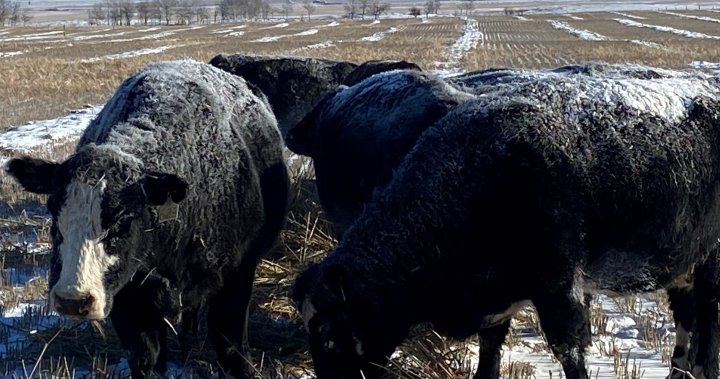Like a Pied Piper of the prairies, Doug Wray has a big following at his ranch northeast of Calgary on this frosty Saturday morning. Instead of music, however, the Irricana area rancher is using food to lure his bovine followers. His herd is ravenous during this record-breaking cold.
“We’re close to as cold as it gets,” said Wray who is a third-generation rancher north of Calgary. “They are healthy and well fed and they’re pretty robust in the cold,”
Preparations for this winter cold started back in the heat of the summer when cattle are fed so that they will have the fat they need to survive.
“We try and have them in good shape. A fat cow can handle the cold pretty well,” Wray said.
Wray said his family works with an animal nutritionist to make sure the cattle have a balanced diet.
“The human population doesn’t always have a balanced diet but the livestock population does because people are looking after them. The cow builds up that back fat in her body and if she has that she can burn it off to deal with the cold. So, she might lose three or four pounds today but she weighs 1,300 or 1,400 pounds,” Wray said.
A good water system is essential too. Most operations have electric heaters to keep water flowing but producers still need to constantly monitor it.
“If you get a good set up and ours fortunately have worked but we know around the country there will be frozen water and people dealing with it,” Wray said.
He says cattle will avoid the wind to keep safe.
Get the latest National news.
Sent to your email, every day.
“On Wednesday morning, the north wind was blowing and they looked at me and said, ‘We’re not headed out there.’ We fed them in the corrals behind shelter out of the wind for the last three days. Today the wind has dropped. It’s the coldest day yet. It’s -39 C here but they willingly went to the field to get that feed,” Wray said.
“The wind is the big thing. If it’s windy, you have to get them out of the wind and keep them well fed and bedded.”
It’s been a costly week keeping cattle nourished. Feed prices are higher than normal because of the drought.
“We are feeding almost double at this temperature than we were a week ago,” Wray said.
Airdrie-area veterinarian Dr. Sydney Crosby says for cattle specifically, every degree below zero usually increases their demand for food by two per cent.
“So on a crazy week like this, that could have a significant impact on these producers and having to increase their feed by 80 per cent, which is just bonkers,” Crosby said.
Crosby, who is a bovine specialist, says purebred producers are calving now which means babies need to be in the barn as soon as possible because they are susceptible to frostbite and hypothermia. She says in general mature cows are fine in the cold as long as they’re dry and well fed.
“If they get into water or their hide is wet in any sort of place, then they can get frostbite. The occasional ones do lose their ears sometimes,” Crosby said.
Crosby said horses do okay in the cold as well, but blankets are important and so is water.
“They tend to drink less water when it’s really cold out. It’s important to get them to continue drinking water,” Crosby said.
Wray said he has friends who are in Phoenix now but he wouldn’t trade a frigid morning with his cows for the seats by the pool.
“I love it. I’ve been here my whole life. When you get to work in an industry and a job that’s very rewarding and working with nature it’s a very rewarding thing to do. We’re pretty happy to be out. It’s a beautiful day,” Wray said. “People talk about -40 C but it doesn’t happen very often. We’re close to as cold as it gets.”
Wray says he’s pretty strategic when he heads out the door when it comes to what chores he has for the day.
“We’re going to get things done as efficiently as possible. Yesterday we had a flat tire on the tractor which upset the apple cart, but we managed to get it dealt with and the cattle fed,” Wray said.
The Alberta SPCA has received a significant increase in calls since the weather changed.
“Winter was already busy with the drought impacting feed availability, the existing pressures on the system, and now the extreme cold has made it even worse,” said Alberta SPCA executive director Leanne Niblock.
“Many people, often when they’re traveling down the highway, wonder if horses need blankets in the winter. Luckily, most horses that live outside can handle the cold well with their own winter coats. Blanketing is not often required,” Niblock said. “People sometimes wonder if snow on the backs of cattle or horses is bad – it’s not. It means they’re well insulated and as long as they’re dry and not wet, they should be ok.”
She says if someone thinks they see an animal in distress outside of the cities of Edmonton and Calgary, they can call 1-800-455-9003.
© 2024 Global News, a division of Corus Entertainment Inc.



